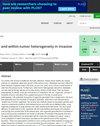Benchmarking multi-ancestry prostate cancer polygenic risk scores in a real-world cohort
IF 3.6
2区 生物学
引用次数: 0
Abstract
Prostate cancer is a heritable disease with ancestry-biased incidence and mortality. Polygenic risk scores (PRSs) offer promising advancements in predicting disease risk, including prostate cancer. While their accuracy continues to improve, research aimed at enhancing their effectiveness within African and Asian populations remains key for equitable use. Recent algorithmic developments for PRS derivation have resulted in improved pan-ancestral risk prediction for several diseases. In this study, we benchmark the predictive power of six widely used PRS derivation algorithms, including four of which adjust for ancestry, against prostate cancer cases and controls from the UK Biobank and All of Us cohorts. We find modest improvement in discriminatory ability when compared with a simple method that prioritizes variants, clumping, and published polygenic risk scores. Our findings underscore the importance of improving upon risk prediction algorithms and the sampling of diverse cohorts.真实世界队列中多宗族前列腺癌多基因风险评分的基准分析
前列腺癌是一种遗传性疾病,其发病率和死亡率与祖先有关。多基因风险评分(PRSs)在预测包括前列腺癌在内的疾病风险方面取得了令人鼓舞的进展。虽然多基因风险评分的准确性在不断提高,但如何提高其在非洲和亚洲人群中的有效性仍是公平使用的关键。最近,PRS推导算法的发展改善了几种疾病的泛宗族风险预测。在本研究中,我们以英国生物库和 "我们所有人 "队列中的前列腺癌病例和对照组为对象,对六种广泛使用的 PRS 推算算法的预测能力进行了基准测试,其中四种算法对血统进行了调整。我们发现,与优先考虑变异、结块和已公布的多基因风险评分的简单方法相比,我们的判别能力略有提高。我们的发现强调了改进风险预测算法和对不同队列采样的重要性。
本文章由计算机程序翻译,如有差异,请以英文原文为准。
求助全文
约1分钟内获得全文
求助全文
来源期刊

PLoS Computational Biology
生物-生化研究方法
CiteScore
7.10
自引率
4.70%
发文量
820
期刊介绍:
PLOS Computational Biology features works of exceptional significance that further our understanding of living systems at all scales—from molecules and cells, to patient populations and ecosystems—through the application of computational methods. Readers include life and computational scientists, who can take the important findings presented here to the next level of discovery.
Research articles must be declared as belonging to a relevant section. More information about the sections can be found in the submission guidelines.
Research articles should model aspects of biological systems, demonstrate both methodological and scientific novelty, and provide profound new biological insights.
Generally, reliability and significance of biological discovery through computation should be validated and enriched by experimental studies. Inclusion of experimental validation is not required for publication, but should be referenced where possible. Inclusion of experimental validation of a modest biological discovery through computation does not render a manuscript suitable for PLOS Computational Biology.
Research articles specifically designated as Methods papers should describe outstanding methods of exceptional importance that have been shown, or have the promise to provide new biological insights. The method must already be widely adopted, or have the promise of wide adoption by a broad community of users. Enhancements to existing published methods will only be considered if those enhancements bring exceptional new capabilities.
 求助内容:
求助内容: 应助结果提醒方式:
应助结果提醒方式:


